Bra podcast
Sveriges mest populära poddar
Overview
The long awaited preview of snapd-based AppArmor file prompting is finally seeing the light of day, plus we cover the recent 24.04.1 LTS release and the podcast officially moves to a fortnightly cycle.
This week in Ubuntu Security Updates
45 unique CVEs addressed
[USN-6972-4] Linux kernel (Oracle) vulnerabilities
- 18 CVEs addressed in Xenial ESM (16.04 ESM), Bionic ESM (18.04 ESM)
[USN-6982-1] Dovecot vulnerabilities
- 2 CVEs addressed in Noble (24.04 LTS)
[USN-6983-1] FFmpeg vulnerability
- 1 CVEs addressed in Xenial ESM (16.04 ESM), Bionic ESM (18.04 ESM), Focal (20.04 LTS), Jammy (22.04 LTS), Noble (24.04 LTS)
[USN-6984-1] WebOb vulnerability
- 1 CVEs addressed in Focal (20.04 LTS), Jammy (22.04 LTS), Noble (24.04 LTS)
[USN-6973-4] Linux kernel (Raspberry Pi) vulnerabilities
- 9 CVEs addressed in Bionic ESM (18.04 ESM)
[USN-6981-2] Drupal vulnerabilities
- 3 CVEs addressed in Trusty ESM (14.04 ESM)
- 2 of these are in the CISA KEV - Discussion of CISA KEV from Episode 231
[USN-6986-1] OpenSSL vulnerability
- 1 CVEs addressed in Jammy (22.04 LTS), Noble (24.04 LTS)
[USN-6987-1] Django vulnerabilities
- 2 CVEs addressed in Bionic ESM (18.04 ESM), Focal (20.04 LTS), Jammy (22.04 LTS), Noble (24.04 LTS)
[USN-6988-1] Twisted vulnerabilities
- 2 CVEs addressed in Trusty ESM (14.04 ESM), Xenial ESM (16.04 ESM), Bionic ESM (18.04 ESM), Focal (20.04 LTS), Jammy (22.04 LTS), Noble (24.04 LTS)
[USN-6985-1] ImageMagick vulnerabilities
- 11 CVEs addressed in Trusty ESM (14.04 ESM)
Goings on in Ubuntu Security Community
Ubuntu 24.04.1 LTS released (02:55)
- On 29th August - https://lists.ubuntu.com/archives/ubuntu-announce/2024-August/000304.html
- https://discourse.ubuntu.com/t/ubuntu-24-04-lts-noble-numbat-release-notes/39890
- Discussed high level features previously in Ubuntu 24.04 LTS (Noble Numbat) released from Episode 227
- New security features / improvements:
- Unprivileged user namespace restrictions
- Binary hardening
- AppArmor 4
- Disabling of old TLS versions
- Upstream Kernel Security Features
- Intel shadow stack support
- Secure virtualisation with AMD SEV-SNP and Intel TDX
- Strict compile-time bounds checking
- New security features / improvements:
- Initially offered upgrades from 22.04 but this has been pulled just recently
due to reports of a critical bug in the ubuntu-release-upgrader package and
its interaction with the apt solver - essentially resulting in packages like
linux-headers being in an broken state since it would remove some packages
that were seen as obsolete but which were still required due to other packages
depending on them
- likely will not be fixed until early next week
Ubuntu Security Center with snapd-based AppArmor home file access prompting preview (05:45)
- https://news.itsfoss.com/ubuntu-security-center-near-stable/
- Details the new Desktop Security Center application
- Written by the Ubuntu Desktop team - new application built using Flutter + Dart etc and published a snap
- Eventually this will allow to manage various security related things like
full-disk encryption, enabling/usage of Ubuntu Pro, Firewall control and
finally for snap permission prompting
- this last feature is the only one currently supported - has a single toggle which is to enable “snaps to ask for system permissions” - aka. snapd-based AppArmor prompting
- and then once this is enabled, allows the specific permissions to be futher fine-tuned
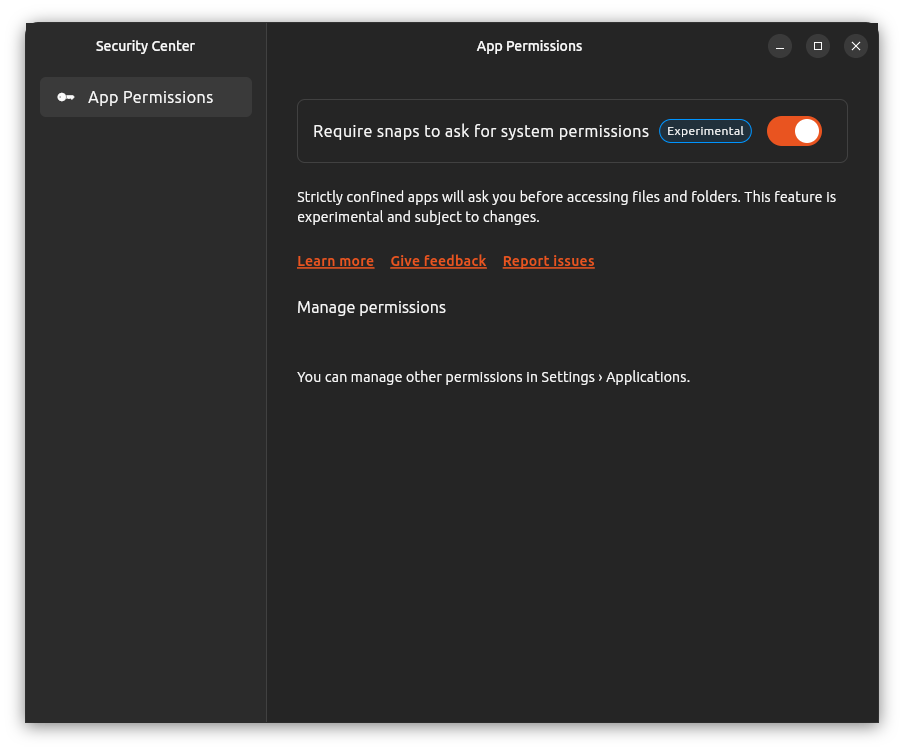
- What is AppArmor?
- AppArmor policies - and MAC systems in general are static - policy defined by sysadmin etc
- Not well suited for dynamic applications that are controlled by a user - like desktop / CLI etc - can’t know in advance every possible file a user may want to open in say Firefox so have to grant access to all files in home directory just in case
- Ideally system would only allow files that the user explicitly chooses - number of ways this can be done, XDG Portals one such way - using Powerbox concept pioneered in tools from the object-capability based security community like CapDesk/Polaris and Plash (principle of least-authority shell) - access is mediated by a privileged component that acts with the users whole authority to then delegate some of that authority to the application - seen say in the file-chooser dialog with portals - this runs outside of the scope of the application itself and so has the full, unrestricted access to the system to allow a file to be chosen - then the application is then just given a file-descriptor to the file to grant it the access (or similar)
- This only works in the case of applications that open files interactively - can’t allow the user to explicitly grant access to the configuration file that gets loaded from a well-known path at startup in a server application etc
- One way to handle that case is to alert the user and explicitly prompt them for that access - and this is currently how this new prompting feature works
- When the feature is enabled, the usual broad-based access rules for the
homeinterface in snapd get tagged with a prompt attribute - any access then which would normally be allowed is instead delegated to a trusted helper application which displays a dialog to the user asking them to explicitly allow such access
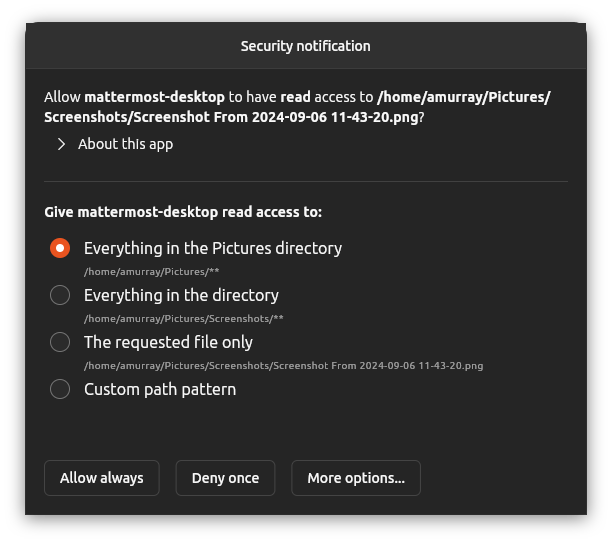
- since this happens directly in the system-call path within the kernel, the application itself is unaware that this is happening - but is just suspended whilst waiting for the users response - and then assuming they grant the access it proceeds as normal (or if they deny then the application gets a permission denied error)
- Completely transparent to the application and supports any kind of file-access regardless of which API might be used (unlike portals which only support the regular file-chooser scenario)
- Allows tighter control of what files a snap is granted access to - and can be managed by the user in the Security Center later to revoke any such permission that they granted
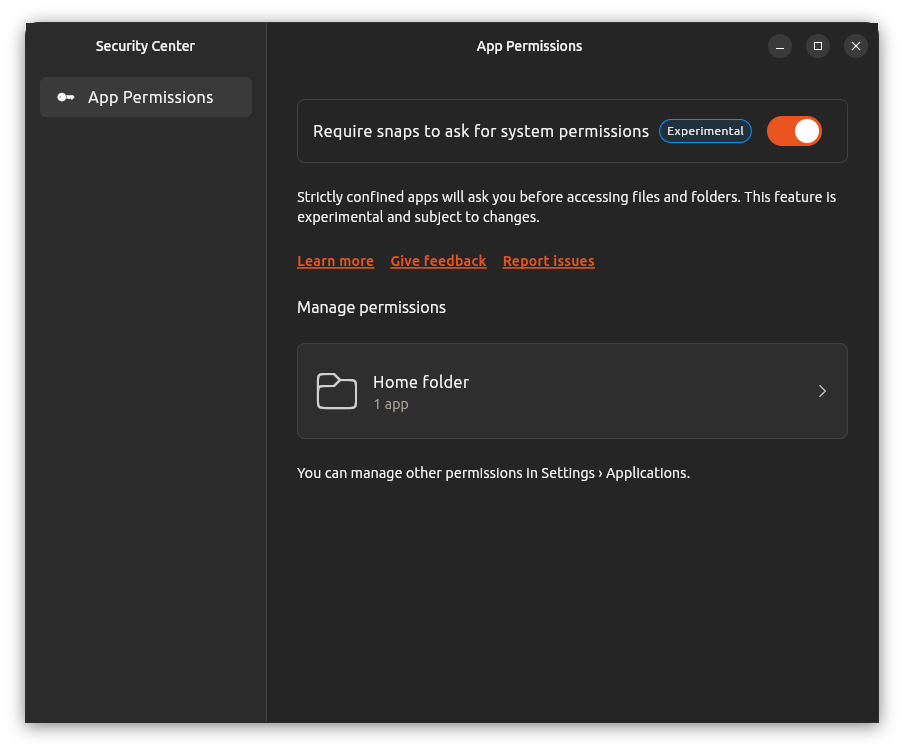
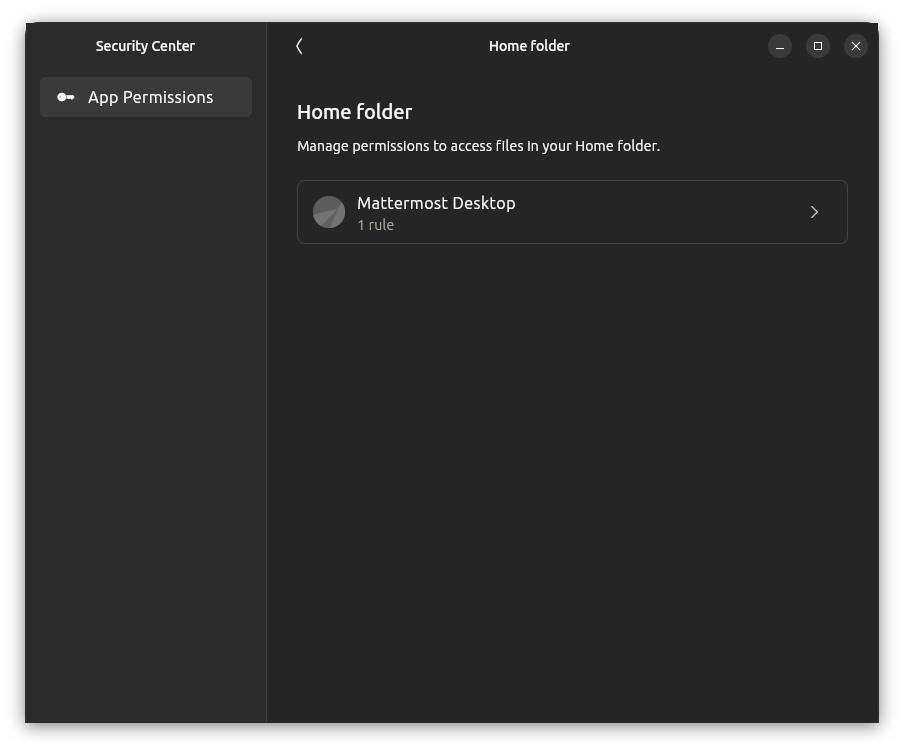
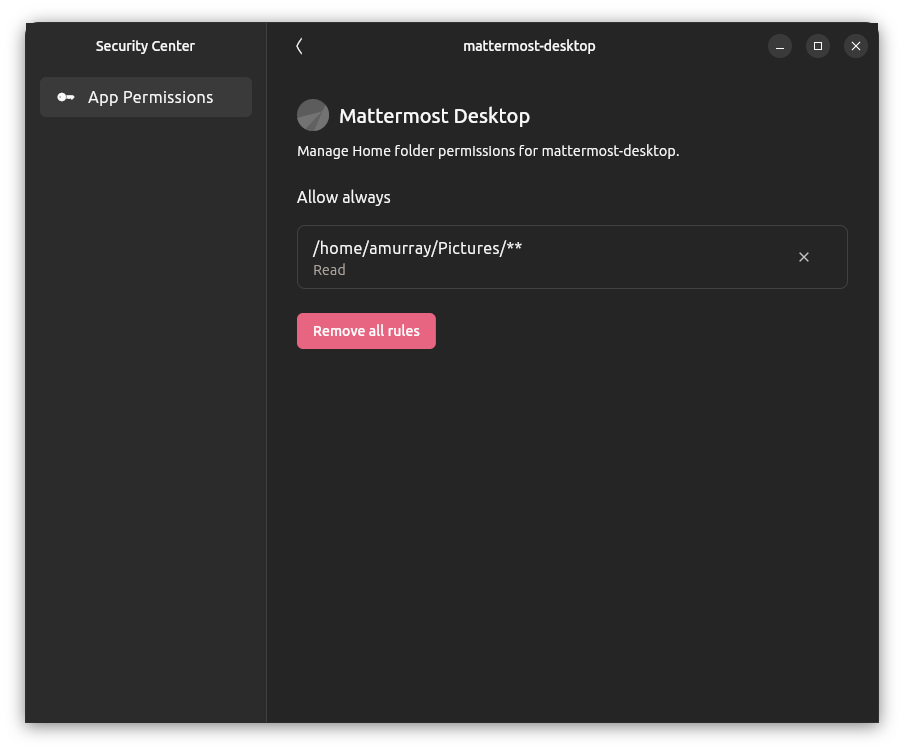
- Has been in development for a long time, and is certainly not a new concept -
seccomp has supported this via the
seccomp_unotifyinterface - allows to delegate seccomp decisions to userspace in a very similar manner - existed since the 5.5 kernel released in January 2020 - Even before that, prototype LSMs existed which implemented this kind of functionality (https://sourceforge.net/projects/pulse-lsm/ / https://crpit.scem.westernsydney.edu.au/confpapers/CRPITV81Murray.pdf)
- Can test this now on an up-to-date 24.04 or 24.10 install
- Need to use snapd from the latest/edge channel and then install both the
desktop-security-centersnap as well as theprompting-clientsnap - Launch Security Center and toggle the option
- Need to use snapd from the latest/edge channel and then install both the
- Note this is experimental but has undergone a fair amount of internal testing
- Very exciting to see this finally available in this pre-release stage - has been talked about since at least 2018
- Give it a spin and provide feedback - I would suggest to use the link in the security center application itself for this but it is not working currently - instead report via a Github issue on the desktop-security-center project
Get in contact
00:00
-00:00